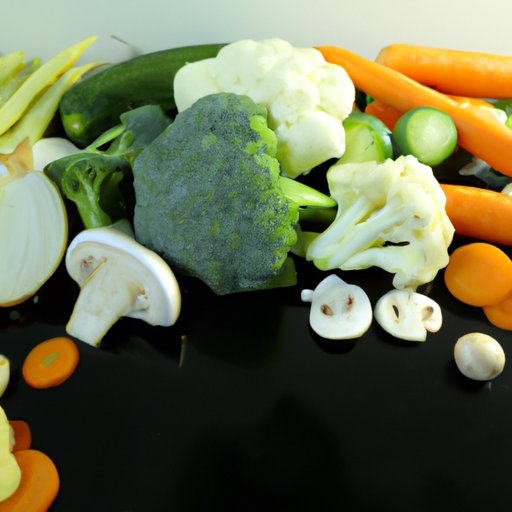Introduction
Protein is an essential nutrient for many bodily functions. It helps build and repair muscle tissue, supports healthy bones, and supplies energy for daily activities. For those looking to increase their protein intake, adding more plant-based sources of protein can be a great way to amp up your dietary game. Learn about the vegetables with the most protein and how to incorporate them into your diet.
A Guide to Protein-Packed Vegetables
When it comes to choosing which vegetables are high in protein, there are several different types that offer a range of nutritional benefits. Here’s an overview of the vegetables with the highest protein content.
Identification of High-Protein Vegetable Varieties
Beans, legumes, nuts, seeds, leafy greens, cruciferous vegetables, and starchy vegetables all contain varying amounts of protein. Beans and legumes, such as chickpeas, lentils, and black beans, tend to contain the highest amounts of protein. Nuts and seeds, like almonds and pumpkin seeds, also contain significant amounts of protein. Leafy greens, like kale and spinach, are good sources of protein. Cruciferous vegetables, like broccoli and cauliflower, contain moderate amounts of protein. Starchy vegetables, such as potatoes and sweet potatoes, are slightly lower in protein than other vegetables.
Eating Vegetarian? Here’s What Veggies Have the Most Protein
For vegetarians, getting enough protein can be a challenge. Fortunately, there are plenty of plant-based sources of protein available. Here’s a closer look at some of the best vegetarian protein sources.
Beans and Legumes
Beans and legumes are excellent sources of vegetarian protein. They are relatively inexpensive and easy to prepare. Chickpeas, lentils, and black beans are all great sources of plant-based protein. One cup of cooked chickpeas contains 15 grams of protein, while one cup of cooked lentils has 18 grams of protein. Black beans contain 15 grams of protein per cup.
Nuts and Seeds
Nuts and seeds are another great source of vegetarian protein. Almonds, cashews, and pumpkin seeds are all high in protein. One ounce of almonds contains 6 grams of protein, while one ounce of cashews contains 5 grams of protein. Pumpkin seeds contain 5 grams of protein per ounce.
Leafy Greens
Leafy greens are packed with vitamins and minerals, and they also contain protein. Kale, spinach, and Swiss chard are all excellent sources of plant-based protein. One cup of cooked kale contains 2.5 grams of protein, while one cup of cooked spinach has 5 grams of protein. Swiss chard contains 1.4 grams of protein per cup.
Cruciferous Vegetables
Cruciferous vegetables, such as broccoli and cauliflower, are also great sources of vegetarian protein. One cup of cooked broccoli contains 4.3 grams of protein, while one cup of cooked cauliflower contains 2.5 grams of protein.
Starchy Vegetables
Starchy vegetables, such as potatoes and sweet potatoes, are slightly lower in protein than other vegetables. However, they still contain some protein. One medium potato contains 4 grams of protein, while one medium sweet potato contains 3 grams of protein.
Plant-Based Eating: Which Vegetables Are High in Protein?
When it comes to plant-based eating, incorporating high-protein vegetables is key. Here’s a look at some of the best vegetables to include in your diet.
High-Protein Vegetables to Include in Your Diet
When looking to boost your protein intake, the following vegetables are great options: chickpeas, lentils, black beans, almonds, cashews, pumpkin seeds, kale, spinach, Swiss chard, broccoli, and cauliflower. All of these vegetables are rich in protein and provide a variety of vitamins and minerals.
Nutritional Benefits of Protein-Rich Vegetables
In addition to providing protein, these vegetables also offer a range of other nutritional benefits. For example, beans, legumes, nuts, and seeds are all good sources of fiber. Leafy greens are packed with vitamins A, C, and K. Cruciferous vegetables are rich in antioxidants. And starchy vegetables are a good source of complex carbohydrates.
Supercharge Your Diet with These Protein-Rich Vegetables
Adding more protein-rich vegetables to your diet can help you meet your daily protein needs. Here are some recipes featuring protein-packed vegetables, as well as tips and tricks for incorporating more protein-rich vegetables into your meals.
Recipes Featuring Protein-Packed Vegetables
There are plenty of delicious recipes featuring protein-rich vegetables. Some of our favorites include roasted chickpeas, lentil soup, almond-crusted tofu, kale chips, and sweet potato fries. Experiment with different combinations of protein-packed vegetables to create tasty and nutritious meals.
Tips and Tricks for Incorporating More Protein-Rich Vegetables
If you’re looking for ways to get more protein-rich vegetables into your diet, here are some tips and tricks to try:
- Add leafy greens to smoothies or salads.
- Make a bean-based chili or soup.
- Top pizza or pasta with roasted vegetables.
- Snack on nuts and seeds throughout the day.
- Make veggie burgers with black beans or lentils.
- Add roasted chickpeas to soups or salads.
Conclusion
Vegetables are a great source of protein, and there are many varieties that are packed with this important nutrient. Beans, legumes, nuts, seeds, leafy greens, cruciferous vegetables, and starchy vegetables all contain varying amounts of protein. Adding more protein-rich vegetables to your diet can help you meet your daily protein needs. Try incorporating these vegetables into your meals and snacks to supercharge your diet.
Whether you’re vegan, vegetarian, or just looking to increase your protein intake, adding more protein-packed vegetables to your diet is a great way to boost your nutrition. With a wide range of delicious recipes and easy tips and tricks, it’s never been easier to enjoy the benefits of protein-rich vegetables.


